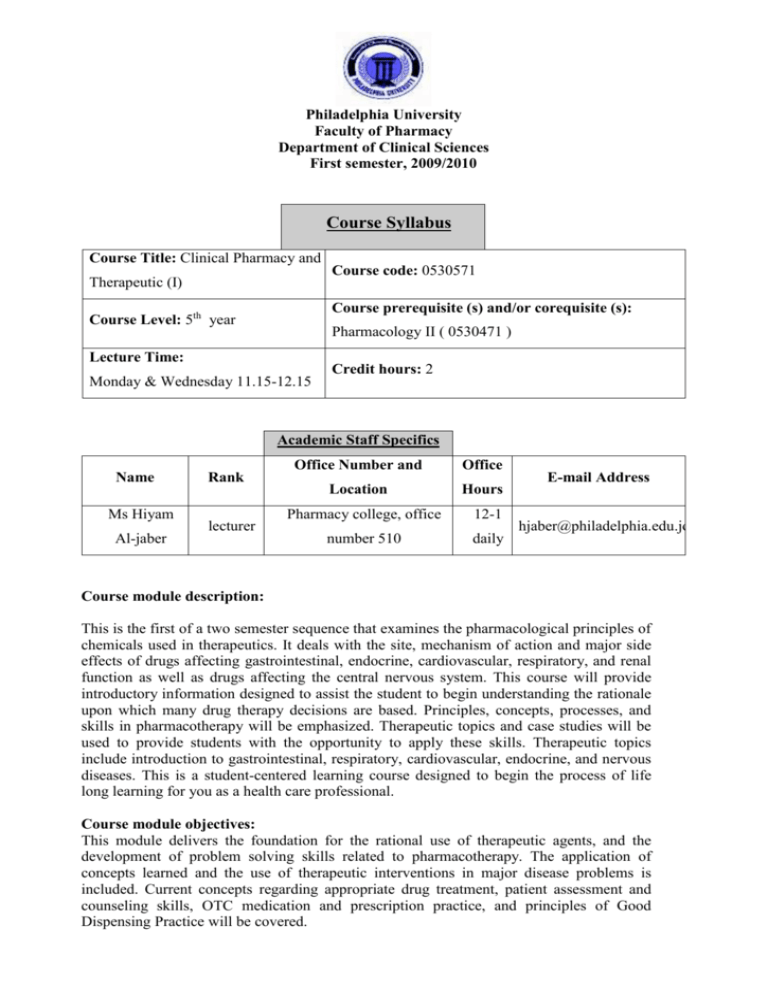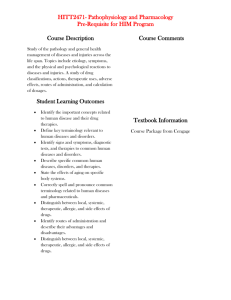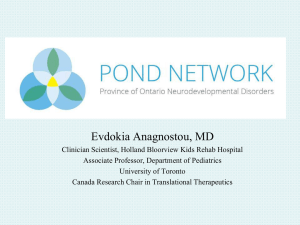التاريخ: 16/9/2007 - Philadelphia University
advertisement

Philadelphia University Faculty of Pharmacy Department of Clinical Sciences First semester, 2009/2010 Course Syllabus Course Title: Clinical Pharmacy and Therapeutic (I) Course code: 0530571 Course prerequisite (s) and/or corequisite (s): Course Level: 5th year Pharmacology II ( 0530471 ) Lecture Time: Monday & Wednesday 11.15-12.15 Credit hours: 2 Academic Staff Specifics Name Ms Hiyam Al-jaber Rank lecturer Office Number and Office Location Hours Pharmacy college, office 12-1 number 510 daily E-mail Address hjaber@philadelphia.edu.jo Course module description: This is the first of a two semester sequence that examines the pharmacological principles of chemicals used in therapeutics. It deals with the site, mechanism of action and major side effects of drugs affecting gastrointestinal, endocrine, cardiovascular, respiratory, and renal function as well as drugs affecting the central nervous system. This course will provide introductory information designed to assist the student to begin understanding the rationale upon which many drug therapy decisions are based. Principles, concepts, processes, and skills in pharmacotherapy will be emphasized. Therapeutic topics and case studies will be used to provide students with the opportunity to apply these skills. Therapeutic topics include introduction to gastrointestinal, respiratory, cardiovascular, endocrine, and nervous diseases. This is a student-centered learning course designed to begin the process of life long learning for you as a health care professional. Course module objectives: This module delivers the foundation for the rational use of therapeutic agents, and the development of problem solving skills related to pharmacotherapy. The application of concepts learned and the use of therapeutic interventions in major disease problems is included. Current concepts regarding appropriate drug treatment, patient assessment and counseling skills, OTC medication and prescription practice, and principles of Good Dispensing Practice will be covered. Course/ module components Books (title , author (s), publisher, year of publication) 1. Clinical Pharmacy and Therapeutics by Roger Walker, C.R.W. Edwards, Publisher: Churchill Livingstone; 4th edition 2007, ISBN: 978-0-443-10286-8. 2. Goodman and Gilman's the pharmacological basis of therapeutics by Brunton,Laurence L. (ed.) ,Lazo,John S. (ed.), & Parker,Keith L. (ed.), New York: McGraw-Hill, 2005, ISBN: 0-07-142280-3. Teaching methods: Classes will be held twice a week. The content of this course will be presented in a variety of different formats: • Didactic lectures; • Assigned readings; and • Group discussion in class. Learning outcomes: Knowledge and understanding Help students to bring knowledge and professional skills together to begin preparation to take care of patients. Cognitive skills (thinking and analysis). Assist students in the improvement of several professional skills. These skills are: problemsolving skills, group dynamic skills, interviewing skills, presentation skills, writing skills, and self-evaluation skills. Communication skills (personal and academic). Students will learn how to work in collaboration with other health care professionals to improve drug therapy. Practical and subject specific skills (Transferable Skills). Students will learn how to collect and interpret data, design, recommend, carry out, monitor, and change patient specific pharmacotherapy. Assessment instruments Short reports and/ or presentations, and/ or Short research projects Quizzes. Home works Final examination: 50 marks Allocation of Marks Assessment Instruments Mark First examination 15 Second examination 15 Final examination: 50 marks 50 Reports, research projects, Quizzes, Home 20 works, Projects Total 100 Documentation and academic honesty It is expected that all students help to maintain an environment of academic honesty. The following behaviors are strictly forbidden during the administration of the exam: talking, wearing of hats with bills, checking, sending, and answering of cell phone message including text messages and passing of papers or notes. Students must keep their eyes on their own paper. All students are required to hand-in the packet of test questions with their name and 6-digit student ID number clearly indicated on each page of the exam. Course/module academic calendar week (1) (2) (3) (4) (5) (6) First examination (7) (8) (9) (10) (11) Second examination (12) (13) (14) (15) Specimen examination (Optional) (16) Final Examination Basic and support material to be covered GI system: PUD / NV GI system: Constipation & Diarrhea / IBD Bone & joint disorders: Gout / Osteoporosis Bone & joint disorders: RA Cardiac disorders: HTN / HF Cardiac disorders: Ischemic heart disease ( angina / MI) Cardiac disorders: Thromboembolic disorders (DVT, PE) / Dyslipidemia Endocrine disorders: DM Endocrine disorders: Thyroid abnormalities Respiratory disorders: Asthma / COPD Renal disorders: RF Neurologic disorders: Epilepsy / Headache Neurologic disorders: Pain management / Parkinson’s disease Psychiatric disorders: Sleep disorders / Substance abuse Blood disorders: Anemias Review Homework/reports and their due dates Homeworks will be given during the semester Expected workload: On average students need to spend 2 hours of study and preparation for each 50-minute lecture/tutorial. Attendance policy: Absence from lectures and/or tutorials shall not exceed 15%. Students who exceed the 15% limit without a medical or emergency excuse acceptable to and approved by the Dean of the relevant college/faculty shall not be allowed to take the final examination and shall receive a mark of zero for the course. If the excuse is approved by the Dean, the student shall be considered to have withdrawn from the course. Module references Books 1. Applied Therapeutics: The Clinical Use of Drugs by Mary Anne Koda-Kimble, Lloyd Yee Young, Wayne A. Kradjan, B., Joseph Guglielmo, Brain K. Alldredge, Robin L. Corelli Publisher: Lippincott Williams & Wilkins; 8th edition (June 1, 2004) ISBN: 0781748453. 2. Textbook of therapeutics: drug and disease management by Helms,Richard, Philadelphia: Lippincott Williams & Wilkins, 2006, ISBN: 0-7817-5734-7. 3. Lecture notes. Clinical pharmacology and therapeutics by: Reid,John L. (Author) ;Rubin,Peter C. (Author) ;Walters,Matthew R. (Author), Malden, Massachusetts: Blackwell Publishing, 2006, ISBN: 1-4051-3519-0. Journals American Journal of Therapeutics. Websites http://www.philadelphia.edu.jo/pharmacy/resources.html







